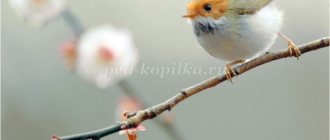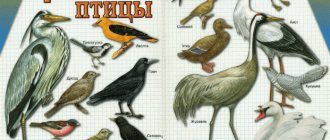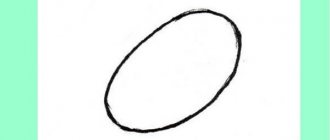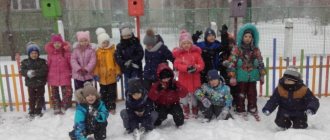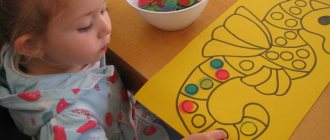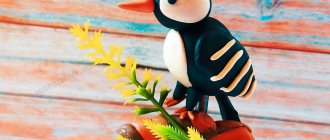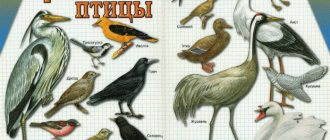Planning
One of the tasks facing a teacher who plans to prepare a chosen topic is to enrich the vocabulary of the children being taught and to actively use the vocabulary of the lesson. In this regard, in daily conversations it is important to use terms, concepts and discuss issues that are directly related to the topic:
Birdhouse
- “migratory birds”, “wintering”, “waterfowl”, “flying for the winter”, “birdhouse”, “nest”, “hatching eggs”, “breeding offspring”;
- swans, ducks, rooks, swallows, storks, starlings, larks;
- where birds live, how they breed, what the growing chicks eat;
- winter is a difficult period in the life of birds; How can people support birds?
The culmination of the work done should be a memorable event, during which the children will be able to take advantage of the acquired knowledge. As a final touch, a thematic quiz, exhibition of crafts or drawings on a given topic is suitable. Parents' participation in the creative process always enhances children's understanding of the significance of the event. What will be truly memorable will be the hanging of feeders on the site, created with the help of the mothers and fathers of the pupils.
Drawing
Mini-project of thematic work
To develop and maintain interest in the proposed topic during the thematic week, it is desirable to create in children additional emotions and experiences that can turn abstract-sounding concepts into more realistic ones.
Interesting! Listening and discussing literary works, dramatization and watching videos and animated materials dedicated to the life of a flock of birds will help the child become more imbued with the desire to help birds and love wildlife.
Planning a thematic week “Birds of Migratory”
When planning the theme of the week “Birds of Migratory” in the preparatory group, the goal is to conduct daily lessons on one topic. Classes are held in a variety of formats, which helps preschoolers maintain interest in the topic throughout the week.
Children learning about birds is good for their overall development
Target
The purpose of the thematic week “Birds of Migratory” is:
- preschoolers gain new knowledge about animals;
- systematization of existing ones;
- the formation of a sustainable interest in the nature of the native land;
- ability to distinguish between different species;
- developing an understanding of the importance of animals in nature.
Lexical topic
The lexical topic “Migratory Birds” pursues the following goals:
- expand children's vocabulary;
- repeat words already familiar to children;
- formulate sentences correctly when composing a story.
Note! To achieve these goals, the teacher gives children tasks from the vocabulary section “Add!” The teacher reads short poems about migratory birds in which the last word is missing. Kids must fill in the missing words in the rhyme.
Thematic vocabulary is replenished with the following words:
- rook;
- swift;
- martin;
- crane;
- stork;
- wagtail;
- cuckoo;
- starling;
- heron;
- swans;
- lark;
- goose;
- fluff;
- feathers;
- wedge;
- flight;
- birdhouse;
- nest;
- insects;
- insect larvae;
- seeds;
- songbirds;
- twist;
- bring out;
- hatch;
- eggs;
- feed;
- peck;
- fly away;
- spring;
- spend the winter.
Book reading is required
Final event
It is recommended that the final event in the preparatory group be held in the form of a quiz. The group is divided into two or more teams with a captain. Each receives assignments on the topic “Migratory Birds”. Each task is assessed using a point system and the winner is determined based on the results.
Mini project
One week is given to prepare the mini-project (step-by-step preparation method). Children prepare it together with their parents at home. Each pupil and parent receives the name of a migratory bird on which he must collect information:
- Photo on removable media to display on a media board using a projector.
- Description of appearance.
- Habitat.
- Time to return to Russia and fly to winter quarters.
- Nutritional features.
Didactic game on the topic of ecology in preparatory groups of preschool educational institutions
After preparing the project, each child defends it in front of the group. This final lesson gives preschoolers the opportunity not only to prepare information on their own, but also gives them experience in public speaking and helps overcome shyness and fear of an audience.
Interesting! The senior group can also participate in the mini-project.
Long-term event planning table
To achieve the greatest effect from a short-term (1 week) project, it makes sense to draw up a calendar plan, taking into account natural circumstances - the readiness of birds to fly to warmer climes (in autumn) or arrive after wintering (in spring). On spring days, the folk calendar also contains dates and events, the symbols of which are certain breeds of birds. Folk traditions foster respect for the history of their people, the ability to appreciate the cultural heritage of their native land and maintain the connection between times.
Reminders on traffic rules for parents in kindergartens: consultations and meetings
| Time of year (the exact month is determined depending on the climatic characteristics of the region and the folk calendar) | Observations and actions carried out on the street during a walk | Activities in addition to daily themed classes. |
| Autumn (late September, October, early November) |
|
|
| Spring (late February, March, early April) |
|
|
ECD on the topic “Migratory Birds” in the senior group
If the theme of the week is “Migratory Birds,” the senior group should conduct a variety of activities that foster a love and interest in wildlife. Children will be happy to take part in making delicious treats for their feathered friends.
To conduct the lesson, you will need the following products, agreed upon in advance with parents and brought by the children from home:
- Butter or melted lard (lard);
- Pumpkin and sunflower seeds;
- Dried berries.
Seeds, berries and lard are mixed in a large container. Children fold pre-prepared ropes 35-40 cm long in half. The rope should be placed in the center of the balls formed by the children from the resulting mixture. The finished delicacy is hung on the branches of trees growing on the site.
Origami classes
The origami technique develops accuracy, precision of movements and eye.
Interesting! Children who have the ability to fold, especially small paper miniatures, have a chance in the future to master professions that require developed hand motor skills.
Outline diagram Duck
Application
For an application on the theme “Birds” in the senior group, the teacher chooses the technique at his own discretion, taking into account the requirements of the Federal State Educational Standard.
Drawing lesson in the second junior group on the topic “Planes are flying”
To conduct the lesson, you will need a pre-prepared template depicting the outline of a bird. Children, having transferred the image onto a thick sheet of paper or cardboard, can
- fill the outline with pieces of colored paper using the mosaic technique;
- perform applique by placing cut-out parts on top of each other, using multi-colored paper for different parts of the body
- make stained glass applications from colored tracing paper; The application “migratory birds” is also suitable for the preparatory group
Stained glass
Progress of observation
At ugly winter crossroads
The snow from the day before yesterday was still there,
He did not like the warm spring bliss,
But it was so difficult to protect yourself!
There are signs: if the snow flakes become large, wait for a thaw; the bullfinch sings in winter in the snow, blizzard and slush - wait for early spring . What happens to snow when the sun gets hot? What color does the snow become? Where does snow melt faster - in the shade or in the sun?
Research activities. Measure the depth of snow in the sun and in the shade.
Labor activity: Sweep snow from buildings and benches. Goal: to teach how to finish what you have started.
Outdoor games "Wolf in the Moat"
,
“Burners”
- Purpose: to teach
to jump over the ditch and back , to quickly run forward ;
"Wolf and Goat"
— Goal: to improve the execution of movements when running and walking.
Individual work “In a straight line”
— Goal: learn to ride a bicycle.
Cognitive and research activities
"Water Evaporation"
Goal: to establish the dependence of water evaporation on air temperature, illumination and water surface area
Work before bed
Reading.
Self-service and email everyday life work Reading L. Tolstoy “Varya had a siskin...”
Goal: To teach emotional perception of the figurative content of the work, understanding the meaning of the author’s use of means of expression.
Exercise “What everyone should have”
.Goal: to remind children about personal hygiene items: toothbrush, comb, handkerchief.
Evening: Engine.
Communicative
Labor Gradual rise of children, air baths, invigorating gymnastics, walking along the path of health.
Conversations with children “How to help birds in spring ”
- repetition of
bird , familiarization with the simplest classification;
nurturing a caring, reverent attitude towards feathered representatives of the animal world. Cognitive and research activity “What do birds build nests ?”
Goal: to identify some features of the lifestyle
of birds in the spring . Speech games and exercises “Compare and name according to the model”
Purpose: education of the comparative degree of adjectives.
Learning the poem “Ten birds - a flock”
I. Tokmakova. Goal: to promote memory development, enrich children’s vocabulary with
bird . FINE Bird's
Nest ” . Purpose: To consolidate the ability to draw with colored pencils with different pressure on the pencil.
Conversation “Good Doctor Aibolit”
.Goal: to develop healthy lifestyle skills.Introduce: attributes for S.R.I.
“Bird Family”
Goal: expand the understanding of birds , develop the ability to establish cause-and-effect relationships, develop communication skills through communication in a team;
Materials for constructive and model activities from paper “Birdhouse”
.Goal: learn to lay out geometric shapes according to
verbal instructions .
Walk D. and P. I, play Outdoor game. "Sparrows and the car"
Goal: to practice running, to teach how to run without colliding with each other, to develop the ability to act on a signal.
Didactic game “Who will fly after whom”
Goal: consolidate ideas about
migratory birds , activate vocabulary.
Thursday Morning:
SPF
receiving children, games, communication, morning exercises, duty, preparing for breakfast, breakfast, activities. after breakfast, preparation for OOD. Engine
Communicative
Labor Morning exercises.
Conversation Getting to know the “ Bird ”
Purpose: to clarify children’s understanding of the structure of birds . Improve the ability to use the symbolic structure of birds
D.I. “Call me kindly.” Birds "
Goal: learn to select words in diminutive form.
Meeting natural history writers
Goal: broadening the horizons of children; nurturing interest in fiction.
Reading A. I. Kuprin “Song of the Starling”
.Goal: learn to answer questions based on the content of the text.
D.I. “Description of
birds . Compiling a story from pictures .
Goal: learn to describe birds , noting their characteristic features. Learn
make up a story using pictures. Learn to solve riddles on the topic.
Educational interactive game “Right - Left”
.Goal: to strengthen the ability to navigate in space.
Didactic game “What is too much?”
Goal: mastering the formation of nouns in the genitive plural.
Drawing on sand “ Bird ”
.Goal: develop motor skills. Introduce: Lotto
“Healthy Products”
. Goal: remember the rules of the game.
attributes for S.R.I. “Let’s feed
the birds ” Goal: expand the understanding of birds
, about their diet, develop the ability to establish causally
-consequences, develop interest in
joint games.
Add portraits of writers.
Organize a book exhibition
Goal: developing interest in the book as a future source of information.
Introducing a diagram for composing a descriptive story about a bird . Purpose: to train children in composing stories about birds .
GCD
Com Software content Equipment and materials
1. Speech therapy by subgroups (according to the speech therapist’s plan )
HER 2. Application (HER)
No. 12.
“Fairytale
Bird ” by T. S. Komarova Page. 87
Strengthen children's ability to cut out parts of an object of different shapes and make an image from them. Learn to convey the image of a fairytale bird , decorate individual parts and details of the image. Strengthen the ability to cut out symmetrical parts from paper folded in half (tails of different configurations)
.
Develop imagination, activity, creativity, the ability to highlight beautiful works and talk about them. Pale background paper, sets of different colored papers, including gold and silver, envelopes with scraps, scissors, glue, glue brush, napkin (for each child)
.
Walk
D.I.P.I, game Observation of the altitude of the Sun The goal is to consolidate knowledge about the influence of solar energy on the life of plants, animals and humans.
